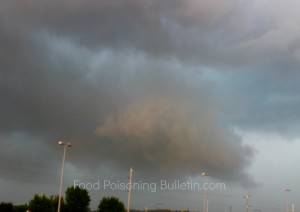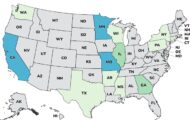 Extreme heat and rain increase the risk of Salmonella infections, according to a new study by Maryland researchers. The study, “Climate Change, Extreme Events and Increased Risk of Salmonellosis: Evidence for Coastal Vulnerability,” was published online June 18, 2015 in the journal Environment International by researchers from the University of Maryland and the Maryland Department of Health and Mental Hygiene Chengsheng Jiang, Kristi Shaw, Crystal Upperman, David Blythe, Clifford Mitchell, Raghu Murtugudde, Amy Sapkota and Amir Sapkota.
Extreme heat and rain increase the risk of Salmonella infections, according to a new study by Maryland researchers. The study, “Climate Change, Extreme Events and Increased Risk of Salmonellosis: Evidence for Coastal Vulnerability,” was published online June 18, 2015 in the journal Environment International by researchers from the University of Maryland and the Maryland Department of Health and Mental Hygiene Chengsheng Jiang, Kristi Shaw, Crystal Upperman, David Blythe, Clifford Mitchell, Raghu Murtugudde, Amy Sapkota and Amir Sapkota.
“We found that extremely hot days and periods of extreme rainfall are contributing to salmonella infections in Maryland, with the most dramatic impacts being seen in the coastal communities,” said Amir Sapkota, associate professor in the Maryland Institute for Applied Environmental Health at UMD and a co-author of the study. “As we prepare for the future, we need to take this differential burden into account”
Salmonella, which sickens an estimated 1.2 million Americans each year, is commonly found in raw poultry, eggs and beef, and unwashed produce. If ingested it can cause an infection called salmonellosis with symptoms including diarrhea, fever, vomiting and abdominal cramps.
For the study, researchers looked at 10 years of data about Salmonella infections in Maryland and compared them with extreme heat and precipitation events from 2002 to 2012. They found that extreme heat was associated with a 4.1 percent in the risk of salmonellosis, and extreme precipitation events were associated with a 5.6 percent increase. Coastal areas were at higher risk than inland areas.
Researchers say the study “highlights the need to engage public health practitioners and policymakers to prepare for and respond to climate change-associated adverse health effects at local, state and national levels.”




